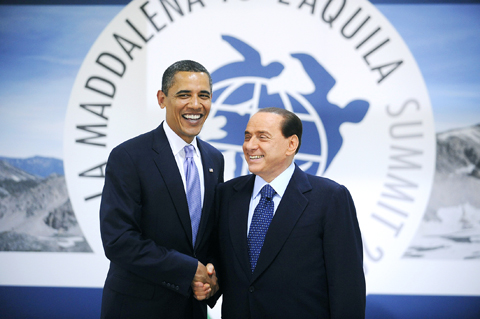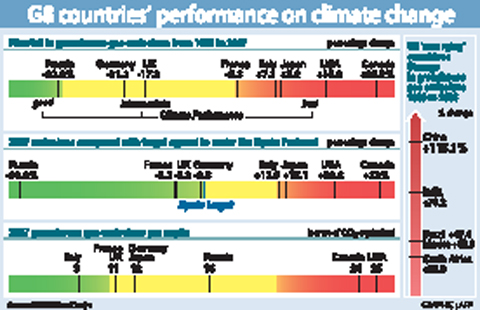G8 leaders have failed to get emerging powers to agree to climate change goals for 2050 and conclusions from their summit will not directly refer to a sensitive debate about the domination of the dollar.
Draft documents seen yesterday ahead of the G8 summit and today’s meeting of the 17-nation Major Economies Forum showed the currency debate pushed by China being played down and that hopes for a climate breakthrough had been overstated.
Making no mention of Chinese and Russian interest in seeking a long-term alternative global reserve currency, a draft seen by reporters talked only of global “imbalances” — which G8 diplomats had said might be the only oblique reference to currency.

PHOTO: AFP
“Stable and sustainable long-term growth will require a smooth unwinding of the existing imbalances in current accounts,” it read.
China complains that dollar domination has exacerbated the global crisis and worries that the bill for US recovery poses an inflation risk for China’s dollar assets, an estimated 70 percent of its official currency reserves.
The G8 meet in in L’Aquila kicked off yesterday with the US, German, Japanese, French, British, Italian, Canadian and Russia leaders discussing the economic crisis.

The draft statement warned “significant risks remain to economic and financial stability.”
The G8 document cautioned that “exit strategies” from growth packages should only be unwound “once recovery is assured.”
G8 leaders badly underestimated the economic problems facing them when they met in Japan last year and yesterday’s talks will touch on what nations must do to prevent another such meltdown.
However, officials said few major initiatives were expected to emerge, with the broader G20 forum, grouping rich industrial nations and major emerging economies, tasked with formulating a regulatory response to the crisis rather than the G8 nations.
The G20 met in London in April and convenes again in September in the US.
“In reality [L’Aquila] is just an intermediary step,” a senior French official said.
US President Barack Obama was expected to make his mark on his first G8 summit by chairing talks of the MEF, whose members account for about 80 percent of global greenhouse gas emissions.
But talks among MEF ministers in Rome, called at the last minute on Tuesday to prepare for the summit, failed to close the gap between US and Europe on the one hand and emerging powers like China and India on the other hand.
Italian Prime Minister Silvio Berlusconi spoke of meeting Chinese “resistance” and the G8 appeared to have failed to persuade China and India to agree to a goal of halving world greenhouse gas emissions by 2050.
“There is indeed a very strong commitment to identify the global goal for substantially reducing global emissions by 2050, but there is no 50 percent” mentioned in a draft declaration, an EU official said on condition of anonymity.
The first day of the L’Aquila summit was due to wrap up with talks on an array of international issues, including Iran’s post-election violence and nuclear program.
One area where officials said a breakthrough might be possible was trade. A draft communique suggested the G8 and “G5” developing nations would agree to conclude the stalled Doha round of trade talks in 2010. Leaders will also discuss a US proposal that rich nations commit US$15 billion over several years for agricultural development in poor countries to ensure food supplies.

MORE VISITORS: The Tourism Administration said that it is seeing positive prospects in its efforts to expand the tourism market in North America and Europe Taiwan has been ranked as the cheapest place in the world to travel to this year, based on a list recommended by NerdWallet. The San Francisco-based personal finance company said that Taiwan topped the list of 16 nations it chose for budget travelers because US tourists do not need visas and travelers can easily have a good meal for less than US$10. A bus ride in Taipei costs just under US$0.50, while subway rides start at US$0.60, the firm said, adding that public transportation in Taiwan is easy to navigate. The firm also called Taiwan a “food lover’s paradise,” citing inexpensive breakfast stalls

TRADE: A mandatory declaration of origin for manufactured goods bound for the US is to take effect on May 7 to block China from exploiting Taiwan’s trade channels All products manufactured in Taiwan and exported to the US must include a signed declaration of origin starting on May 7, the Bureau of Foreign Trade announced yesterday. US President Donald Trump on April 2 imposed a 32 percent tariff on imports from Taiwan, but one week later announced a 90-day pause on its implementation. However, a universal 10 percent tariff was immediately applied to most imports from around the world. On April 12, the Trump administration further exempted computers, smartphones and semiconductors from the new tariffs. In response, President William Lai’s (賴清德) administration has introduced a series of countermeasures to support affected

CROSS-STRAIT: The vast majority of Taiwanese support maintaining the ‘status quo,’ while concern is rising about Beijing’s influence operations More than eight out of 10 Taiwanese reject Beijing’s “one country, two systems” framework for cross-strait relations, according to a survey released by the Mainland Affairs Council (MAC) on Thursday. The MAC’s latest quarterly survey found that 84.4 percent of respondents opposed Beijing’s “one country, two systems” formula for handling cross-strait relations — a figure consistent with past polling. Over the past three years, opposition to the framework has remained high, ranging from a low of 83.6 percent in April 2023 to a peak of 89.6 percent in April last year. In the most recent poll, 82.5 percent also rejected China’s

PLUGGING HOLES: The amendments would bring the legislation in line with systems found in other countries such as Japan and the US, Legislator Chen Kuan-ting said Democratic Progressive Party (DPP) Legislator Chen Kuan-ting (陳冠廷) has proposed amending national security legislation amid a spate of espionage cases. Potential gaps in security vetting procedures for personnel with access to sensitive information prompted him to propose the amendments, which would introduce changes to Article 14 of the Classified National Security Information Protection Act (國家機密保護法), Chen said yesterday. The proposal, which aims to enhance interagency vetting procedures and reduce the risk of classified information leaks, would establish a comprehensive security clearance system in Taiwan, he said. The amendment would require character and loyalty checks for civil servants and intelligence personnel prior to